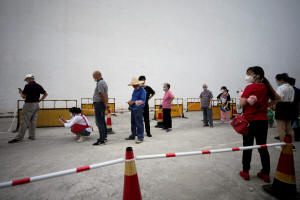Shanghai back on alert as China battles COVID outbreaks
 Send a link to a friend
Send a link to a friend
 [July 07, 2022]
By Brenda Goh and Roxanne Liu [July 07, 2022]
By Brenda Goh and Roxanne Liu
SHANGHAI/BEIJING (Reuters) -Millions of
people in Shanghai queued for a third day of mass COVID-19 testing on
Thursday as authorities in several Chinese cities scrambled to stamp out
new outbreaks that have rekindled worries about growth in the world's
second-largest economy.
Unless local officials succeed in preventing the virus from spreading,
they could be compelled to invoke prolonged, major restrictions on
residents' movement, under China's "dynamic zero COVID" strategy.
Having just emerged from a painful two-month lockdown, Shanghai was
again on high alert as it raced to isolate infections linked to karaoke
services that had been taking place illegally.
Urging karaoke joints to abide by COVID rules and make sure customers
had undergone tests, Shanghai resident Qiu Shijia had a message for
their owners: "Don't push your luck."

Qiu was among a number residents Reuters spoke with in China's most
populous city that were wary of a return to restrictions that had caused
mental stress, and financial hardship for many people, and disrupted
global supply chains and overseas trade.
The latest outbreaks in China have weighed on global asset prices this
week.
"A resurgence of Omicron is not an issue in most other countries, but it
remains a predominant issue for the Chinese economy," Nomura analysts
wrote in a note, referring to the highly transmissible COVID variant.
As China is "by far the largest manufacturing centre in the world, any
new waves of Omicron are likely to have a non-negligible impact", they
added.
Residents in many of Shanghai's 16 districts were ordered to take two
compulsory COVID-tests between Tuesday and Thursday.
They frequently take self-administered tests in order to enter shopping
malls or travel on public transport, and they also have to take part in
city-wide testing every weekend till end-July.
Shanghai reported 54 new locally transmitted COVID cases for Wednesday,
versus 24 the previous day. Only two of those 54 cases were found in the
community, with the rest in quarantine.
Another 50 compounds and venues were locked down on Thursday in the
commercial hub, taking the total to 81.

[to top of second column]
|

People line up to get tested for the coronavirus disease (COVID-19)
at a nucleic acid testing site in Shanghai, China July 7, 2022.
REUTERS/Aly Song

PLAYING WHACK-A-MOLE WITH OUTBREAKS
Overall, mainland China reported 338 new local COVID cases for
Wednesday, down from 353, with no new deaths, numbers which most
countries would now consider insignificant.
Most cases, 167 of them, were in the eastern Anhui province where
more than 1 million people in small towns are locked down.
In the capital Beijing, four new infections were reported, down from
six the previous day.
From July 11, most people entering crowded venues, such as
libraries, cinemas and gyms, will have to have been vaccinated.
After finding one COVID case involving someone who had arrived from
Shanghai, the town of Xinjiang in the northern Shanxi province
tested almost its entire 280,000 population, suspended taxis, ride
hailing and bus services, and closed various entertainment venues.
In a different province, Shaanxi, which reported 4 new cases, the
cultural and tourism authority requested travel agencies to cancel
group tours in its capital Xian, famed for its Terracota Army.
The eastern Jiangsu province, which has cancelled a major sporting
event scheduled for November, reported 61 infections.
China has said its uncompromising COVID policy, as opposed to a
global trend of co-existing with the virus, was saving lives and the
"temporary" economic costs were worth bearing.

Justifying the strategy, officials have contrasted the millions of
COVID-linked deaths around the world, compared with China's reported
the death toll of 5,226.
Analysts warn, however, that some costs may become permanent if
China's debt burden increases and if curbs lead to investors and
talent reconsidering their presence in the country.
China is planning to set up a 500 billion yuan ($75 billion)state
infrastructure fund to revive the economy, two people with knowledge
of the matter have told Reuters.
($1 = 6.7000 Chinese yuan)
(Additional reporting by Wang Jing in Shanghai and Ryan Woo in
Beijing; Writing by Marius Zaharia and John Geddie; Editing by
Himani Sarkar & Simon Cameron-Moore)
[© 2022 Thomson Reuters. All rights
reserved.]
This material may not be published,
broadcast, rewritten or redistributed.
Thompson Reuters is solely responsible for this content. |